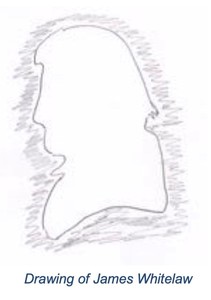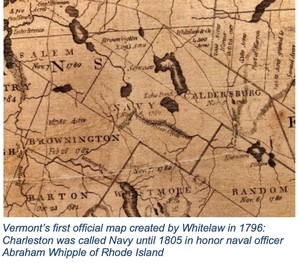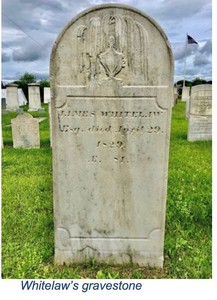by Greg Carpenter
Have you ever wondered how Echo Lake got its name? Or Echo Pond, as it was officially called prior to 1982. It’s been written that James Whitelaw, a native of Scotland who came to America in 1773, is said to have been given credit for doing so. James, as a young man well trained in surveying before coming to the United States, bought land in Ryegate, VT, in 1774 before starting up the Scots-American company. In 1783, Whitelaw was named Deputy Surveyor of the State of Vermont to assist Ira Allen, Vermont’s first surveyor, and later promoted to Surveyor-General to straighten out town boundaries and land disputes.
 Much of Northern Vermont was unsettled at that time, and town lines were in disarray. One of Whitelaw’s jobs during this period of time was to clean up the boundary mess and establish Vermont’s first official map. During his 17 years in this role, he also had a chance to play a hand in naming a pond, river, and even a county found in Vermont. Echo Lake is one of them. According to Esther Swift’s book, Vermont Place-Names Echo was named “because the slightest noise in the area sets up distinct echoes.”
Much of Northern Vermont was unsettled at that time, and town lines were in disarray. One of Whitelaw’s jobs during this period of time was to clean up the boundary mess and establish Vermont’s first official map. During his 17 years in this role, he also had a chance to play a hand in naming a pond, river, and even a county found in Vermont. Echo Lake is one of them. According to Esther Swift’s book, Vermont Place-Names Echo was named “because the slightest noise in the area sets up distinct echoes.”
 Interestingly, Vermont has more than one lake with the same name. The other Echo Lake is in the town of Plymouth. Mr. Whitelaw was laid to rest in Caledonia County, not too far from the town of Charleston. He was buried in 1829 in the Blue Mountain Cemetery in Ryegate, Vermont.
Interestingly, Vermont has more than one lake with the same name. The other Echo Lake is in the town of Plymouth. Mr. Whitelaw was laid to rest in Caledonia County, not too far from the town of Charleston. He was buried in 1829 in the Blue Mountain Cemetery in Ryegate, Vermont.
Sources:
Swift, Esther M, Vermont Place Names. The National Survey. 1977 Manuscript, by James Whitelaw, 1792-93; Wilbur Collection, University of Vermont Library https://www.findagrave.com/memorial/121725062/james-whitelaw
